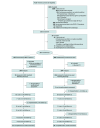Brief Cognitive Behavioral Therapy for Suicidal Inpatients: A Randomized Clinical Trial
- PMID: 39259550
- PMCID: PMC11391362
- DOI: 10.1001/jamapsychiatry.2024.2349
Brief Cognitive Behavioral Therapy for Suicidal Inpatients: A Randomized Clinical Trial
Abstract
Importance: Suicide risk is elevated after discharge from inpatient level of care. Empirically supported inpatient suicide prevention treatments are needed.
Objective: To determine whether adding an inpatient version of brief cognitive behavioral therapy for suicide prevention to treatment as usual reduces postdischarge suicide attempts, suicidal ideation, and psychiatric readmissions and to determine whether substance use disorder moderates treatment effects.
Design, setting, and participants: This randomized clinical trial compared treatment as usual (n = 106) to treatment as usual plus brief cognitive behavioral therapy for inpatients (n = 94) at a private psychiatric hospital in Connecticut. Follow-up assessments were completed monthly for 6 months postdischarge. Participants were enrolled from January 2020 through February 2023. Inpatients admitted following a suicidal crisis (past-week suicide attempt or ideation with plan on admission and attempt within previous 2 years) were included. Medical records of consecutive admissions (n = 4137) were screened, 213 were study eligible and randomized, and 200 were analyzed. A total of 114 participants (57.0%) completed 6-month follow-up assessments. Data from medical records were also obtained through 6-month follow-up.
Intervention: Up to 4 individual sessions of brief cognitive behavioral therapy for suicide prevention designed for inpatients.
Main outcomes and measures: Suicide attempts and readmissions were assessed via blind interviews and medical record review. Suicidal ideation was assessed via self-report.
Results: The mean (SD) age among 200 analyzed participants was 32.8 (12.6) years; 117 participants were female and 83 were male. Brief cognitive behavioral therapy-inpatient reduced the occurrence of suicide attempt over 6 months postdischarge by 60% (odds ratio, 0.40; 95% CI, 0.20-0.80; number needed to treat, 7) in the entire patient group, and the rate of psychiatric readmissions by 71% (rate ratio, 0.29; 95% CI, 0.09-0.90) in those without a substance use disorder. The effect of treatment condition on suicidal ideation was less clear, although post hoc analyses indicated less severe suicidal ideation following brief cognitive behavioral therapy-inpatient vs treatment as usual at 1 and 2 months postdischarge.
Conclusions and relevance: Brief cognitive behavioral therapy-inpatient reduced 6-month postdischarge suicide reattempts and rate of readmissions when added to treatment as usual. Substance use disorder moderated the treatment's effect on readmission rates. Treatment effects on suicidal ideation were less clear. Implementation research is needed to facilitate dissemination. Additional research is also needed to optimize outcomes for individuals with substance use disorders.
Trial registration: ClinicalTrials.gov Identifier: NCT04168645.
Conflict of interest statement
Figures



Comment in
-
Suicide Risk-A Specific Intervention Target.JAMA Psychiatry. 2024 Dec 1;81(12):1171-1172. doi: 10.1001/jamapsychiatry.2024.2273. JAMA Psychiatry. 2024. PMID: 39259547 No abstract available.
References
-
- US Centers for Disease Control and Prevention . Suicide data and statistics. Updated August 10, 2023. Accessed November 19, 2023. https://www.cdc.gov/suicide/facts/data.html?CDC_AAref_Val=https://www.cd...
Publication types
MeSH terms
Associated data
LinkOut - more resources
Full Text Sources
Medical
Miscellaneous

